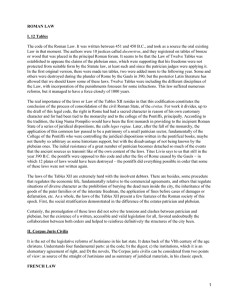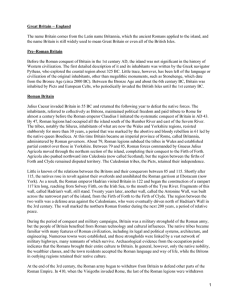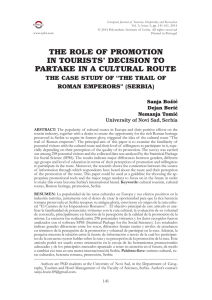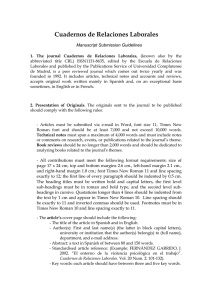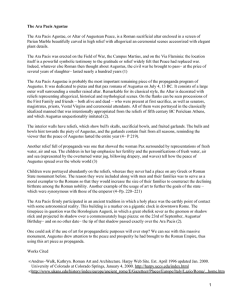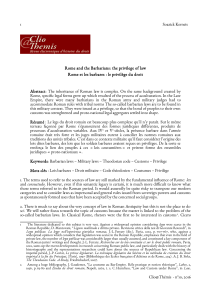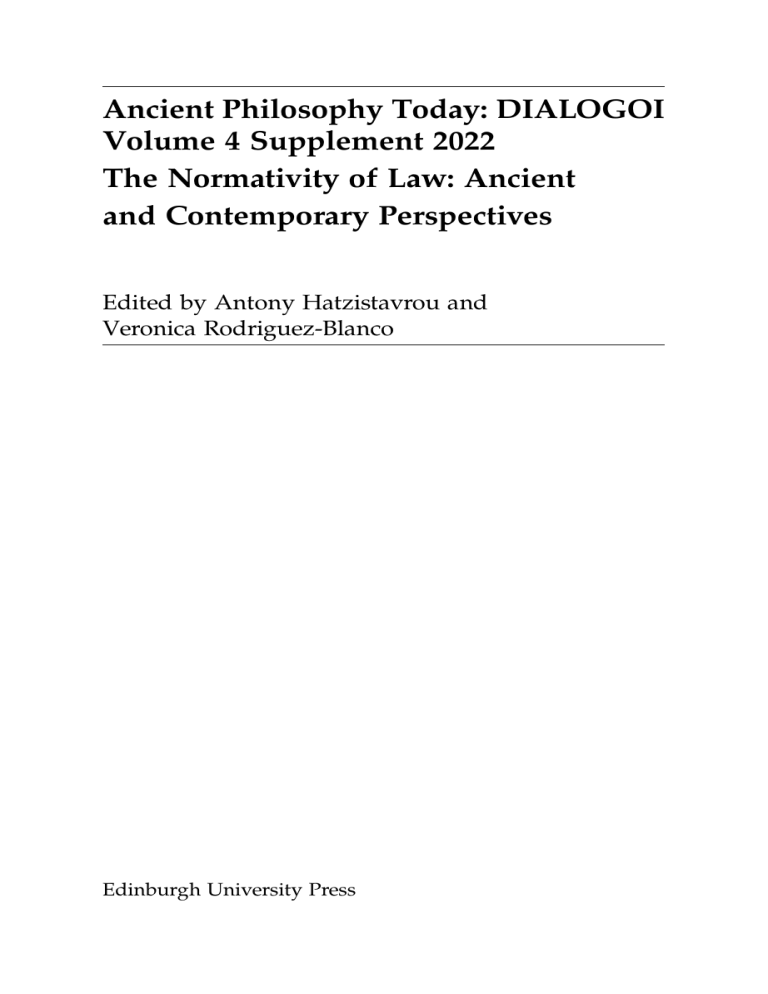
Ancient Philosophy Today: DIALOGOI Volume 4 Supplement 2022 The Normativity of Law: Ancient and Contemporary Perspectives Edited by Antony Hatzistavrou and Veronica Rodriguez-Blanco Edinburgh University Press Contents Supplement: The Normativity of Law: Ancient and Contemporary Perspectives Edited by Antony Hatzistavrou and Veronica Rodriguez-Blanco Introduction The Normativity of Law: Ancient and Contemporary Perspectives Antony Hatzistavrou and Veronica Rodriguez-Blanco 1 Articles Law and the Metaethics of Discord Katja Vogt 3 Plato on Legal Normativity Chris Bobonich 24 Legal Authority and the Dead Hand of the Past. Dworkin’s Law’s Empire and Plato’s Laws on Legal Normativity Andrés Rosler Aristotle and Modern Constitutionalism George Duke The Normativity of Law in Nature Revisited: Natural Law in Late Hellenistic Thought René Brouwer Virtue and the Normativity of Law Amalia Amaya 45 66 91 111 The Normativity of Law in Nature Revisited: Natural Law in Late Hellenistic Thought René Brouwer Utrecht University Abstract In this paper I revisit nature as a source of normativity for law in the later Hellenistic period, that is beyond the opposition of law and nature in the early classical period, Plato’s and Aristotle’s naturalism, or the early Stoics’ conception of the common law. I will focus on the first century BCE, when the expression ‘natural law’ gained prominence, reconstructing its origins in the interaction between Hellenistic philosophers and the Roman elite, including jurists. I argue that for the jurists the Stoic doctrine of law in nature offered a theoretical underpinning for their unique practice of dispute resolution, whereas for the Stoics this Roman practice offered an unexpected opportunity to instrumentalise their conception of law. Keywords: fact, naturalistic fallacy, natural law, nomos, lex, ius, Roman Stoics, Cicero I Introduction In modern jurisprudence positivism has become the dominant position on the normativity of law: its normativity is man-made and is to be found outside nature. Accordingly, positivists distinguish between law and nature, invoking inter alia the naturalistic fallacy that prescriptive norms cannot be derived from descriptive facts.1 However, as I aim to show in this paper, already for historical reasons, here Ancient Philosophy Today: DIALOGOI 4.Supplement (2022): 91–110 DOI: 10.3366/anph.2022.0080 © Edinburgh University Press www.euppublishing.com/anph 92 Ancient Philosophy Today: DIALOGOI with particular focus on the late Hellenistic period, neither the distinction between norm and fact, nor the naturalistic fallacy can be taken for granted. The notion of fact, perhaps surprisingly, has its origins in English law.2 With their conquest of England in 1066 the Norman kings, French speaking and with a Scandinavian background, had to gain control over their newly acquired realm, and one of the means to do so was by offering an extra service to the English people for them to have their disputes resolved with the help of the king’s travelling judges. Already by accepting the judges’ service the English acknowledged the king’s power. Moreover, and relevant here, the judge asked twelve innocent bystanders as representatives of the local population to decide on what had actually occurred after having listened to the accounts of both parties. In accepting this duty, these bystanders, sworn-in (Latin: iurati; hence ‘jury’) that they would judge honestly, once again accepted the king’s power. Thus, a division of labour occurred, between on the one hand the judge deciding on ‘matters of law’ and on the other hand the public, after having heard the parties, deciding on ‘matters of fact’, from the Latin factum, ‘what had been done’.3 The Norman model of dispute resolution was a success: it eventually not only overtook the traditional English forms of dispute resolution, it also influenced the study of nature. In his Advancement of Learning, Francis Bacon, philosopher and Lord Chancellor, as such responsible for the administration of justice in England, transferred the notion of ‘fact’ – ‘as the lawyers speak’, Bacon adds – to the domain of the study of nature.4 Thomas Hobbes followed suit and used ‘fact’ in Human Nature, the first part of his Elements of Law. In chapter 4.8 Hobbes gives the example of someone who has seen that ashes remain after fire: on a subsequent occasion when seeing ashes he can reconstruct the ‘fact’ that there had been a fire.5 The word ended up in the Statutes of the Royal Society,6 and with the success of the natural sciences the notion gained currency also outside the English language: see for example the German word Tatsache (a literal translation of the more precise Latin expression res facti), which the Grimm brothers introduced in the German language in the early 19th century. The separation between law and fact allowed for the formulation of the ‘modern invention’7 of the naturalistic fallacy, most famously by David Hume: ‘In each system of morality […] the author makes observations concerning human affairs; when of a sudden I’m surpriz’d to find, that instead of the usual copulations of propositions, is, and is Natural Law in Late Hellenistic Thought 93 not, I meet with no proposition that is not connected with an ought, or an ought not.’8 From a theoretical point of view the fallacy is nowadays anything but accepted. Hilary Putnam even spoke of the ‘collapse of the fact/value dichotomy’.9 In epistemology this ‘naturalist turn’ was already made by Quine in the 1950s;10 in the domain of human affairs the interest in the normativity of nature has also been rekindled,11 with Sen and Nussbaum’s capabilities approach or Leiter’s naturalised jurisprudence as prime examples.12 In this paper I want to revisit the discussions among Greek and Roman thinkers about nature as a source of normativity for law in the last two centuries BC. This period can either be referred to as late Hellenistic, as modern scholars in ancient philosophy nowadays usually do, or as that of the late Roman Republic. In this period, different from the classical period of Greek thought, when law was primarily put in opposition to nature, and different from the early Hellenistic period, when Epicureans and Stoics debated the role of nature with regard to law, the expression ‘natural law’ is introduced and came to be used by the Roman jurists, such that it has become a standard term not only in philosophical discourse, but also in the study of law and indeed in law itself. I will reconstruct the origins of this expression in the interaction between the Hellenistic philosophers and the Roman jurists. I will argue that different from the Epicureans’ separation of justice and laws and different from the early Stoics’ Cynically inspired conception of law, later Stoics offered a more conservative conception of what since then has come to be referred to as ‘natural law’, providing the Roman jurists with a theoretical foundation of their practice. For the Stoic thinkers in Rome the practice of these jurists offered unexpected alleys in how to instrumentalise their conception of law. The structure of this paper is simple enough. In the next session I discuss how in the classical period of Greek thought law and nature are put in opposition, whereas in the early Hellenistic period they are connected, although in different ways (section II). In section III, the core of the paper, the explicit use of the term ‘natural law’ in the late Hellenistic period is set out and explained against the background of the interaction between the Roman Stoics on the one hand and the Roman jurists on the other. I end with some implications for the modern debate about nature as a source of legal normativity, above all in relation to the relevance of studying the history of the notion of natural law in order to better grasp its scope and conception (section IV). 94 Ancient Philosophy Today: DIALOGOI II Law and Nature in Classical and Early Hellenistic Thought In early Greek thought ‘law’ (nomos) is understood as custom, often considered to be of divine origin – perhaps most famously expressed by Pindar, fr. 169: ‘Law is king of all things human and divine.’ However, in classical Greek thought the meaning of nomos shifts and comes to be understood as statute, that is as man-made law.13 See for example Pericles’ definition as reported by Xenophon, Conversations 1.2.42: ‘Statutes (nomoi) are all those things which the majority has written down, having discussed them in an assembly, declaring what ought and what ought not to be done.’14 These statutes could be engraved in stone and were thus brought in a festive procession – in a display of civic pride – to the market square.15 The Athenians’ focus on statutes provoked reactions from thinkers like Thrasymachus of Chalcedon and Callicles, who – as depicted by Plato – argued that statutes are actually instruments of the weak, curbing those who are stronger by nature.16 In response to this nomos-phusis-debate, as it has come to be known in modern scholarship,17 in which nomos is understood as statute and is hence opposed to nature, both Plato and Aristotle sought to overcome this opposition, without however explicitly using the phrase natural law or law of nature. In Plato’s later dialogues the Statesman and the Laws statutes are an important topic. In the Statesman statutes are introduced as a substitute for the statesman’s insight, comparable to the doctor’s written prescriptions that the patient can follow when the doctor is absent.18 Plato’s Laws (or Statutes, in a less ambiguous, but unconventional rendering of the title of the dialogue) can be understood as a search for the best statutes among the posited statutes of Sparta, Athens and Crete. Plato’s Laws can hence be characterised as the first comparative law treatise, ‘building upon the experience of real men in real cities’.19 The statutes thus found are deemed to be in accordance with nature, which is brought up almost in passing in Laws 4 720e11,20 but more elaborate later on, in book 10.21 It should be noted, however, that in these discussions the phrase natural law or law of nature is not used. In Plato’s writings the phrase ‘law of nature’ occurs only in a single instance. In the Gorgias, at 483e, Callicles argues for the rule of the stronger over the weaker, which he characterises as the ‘law of nature’ (nomos tēs phuseōs). In the context of the nomos-phusis debate, the phrase has thus been aptly characterised as an ‘intentional paradox, almost a contradiction in terms’.22 Natural Law in Late Hellenistic Thought 95 In Aristotle’s extant writings, at Nicomachean Ethics 5.7 1134b18–24, nature is discussed in relation to what is just in the city. This justice can either be ‘natural’ ( phusikos) or ‘statutory’ (nomikos). What is just by nature ‘has the same force everywhere’, whereas what is just by statute is based upon ‘lawgiving’ (nomothetein). At Rhetoric 1.10 1368b8, rather than the phrase ‘just by nature’, the term ‘common law’ (koinos nomos) is used, characterised as ‘unwritten, seemingly acknowledged by everyone’. At Rhetoric 1.13 1373b6 and 1.15 1375a30, this common law is said to be ‘in accordance with nature’ (kata phusin). While seeking to connect law and nature, Plato and Aristotle are thus both still reluctant in using the phrase natural law. In the early Hellenistic period the role of nature with regard to law becomes an even more debated topic. The debate occurs between Epicureans, early Stoics, as well as Academics. The followers of Aristotle appear to have played a limited role, and will hence be left out here.23 Here again the phrase natural law still does not gain currency. As sceptics, the Academics argued against the positions on the role of nature with regard to law as developed by the Epicureans and the Stoics. For Academic criticism of these dogmatists (and hence for the debate among the Epicureans and the Stoics) a main source is the beginning of book 3 of Cicero’s On the res publica, as reconstructed in the modern editions with the help of the account of Lactantius’ Divine Teaching Manual, at 5.14.3–5.24 There it is reported that in Rome in 155 BC Carneades of Cyrene, the head of the Academy and one of the three Athenian ambassadors, gave a brilliant lecture praising a conception of justice based on nature, destroying this conception in another lecture the following day. In typically sceptical fashion Carneades thus apparently aimed at suspension of judgement.25 In On the res publica Cicero emulated Carneades, although with the different aim of finding out which position is more probable. In the dialogue, Laelius, one of the speakers, follows the Stoics in arguing in favour of justice based on nature, whereas Philus (as the devil’s advocate) agrees to follow the Epicureans in arguing in favour of justice as based on usefulness. Different from Carneades, for Cicero the arguments are of different weight: the arguments for the Stoic account are stronger than for the Epicurean one, and so is Laelius’ conception considered to be more probable. Epicureans and Stoics developed rather different positions on the role of nature with regard to its scope. According to Epicurus (341–271 BC) and his followers, nature plays but a restricted role, whereas according to the Stoics, nature and law are closely connected, in the sense that law 96 Ancient Philosophy Today: DIALOGOI is one of the names given to the single active force that pervades nature. Similar opposed positions were taken up by Epicureans and Stoics with regard to both the highest end in life as well as the relation between ethics and physics. With regard to the highest end, in the Epicurean conception of the highest good as avoiding pain nature has only a limited role, whereas in the Stoic conception of the highest good as following nature nature is attributed an all-encompassing role, in that only the sage lives the good life by actively participating in the reason that orders the world.26 With regard to the discussion about how the parts of wisdom relate to each other, Epicurus separates the study of nature from the study of human affairs as much as possible, whereas for the Stoics physics and ethics are fully integrated.27 With regard to the role of nature as a source for normativity, Epicurus makes a distinction between justice and law. Justice in the restricted sense of avoiding harm is based on nature. Epicurus pointed at the earliest natural impulses of babies in their cradles, who would strive for pleasure and avoid harm. Statutes are or should be the man-made means to bring about justice in this restricted sense.28 In an ideal community statutes would not be necessary; elsewhere they should thus simply protect against harm. See Stobaeus 4.1.143 (Epicurus fr. 530 Usener): ‘Statutes (nomoi) do not exist to prevent the wise from doing wrong, but only to protect them from being wronged.’ With regard to statutes, but not with regard to justice, Epicurus can thus be characterised as an anti-naturalist.29 For the Stoics, from Zeno of Citium (334–262 BC), the founder of their school onwards, ‘law’ (nomos) was an important topic. All major early Stoics wrote treatises on law, including Zeno,30 his pupil Sphaerus,31 and his subsequent successors as head of the school: Cleanthes,32 Chrysippus,33 and Diogenes of Babylon.34 As for the relation between law and nature, the Stoics identified ‘law’ (nomos) with the single rational force in nature that shapes the world.35 In the extant sources the early Stoics usually speak simply of ‘law’, sometimes the adjective ‘common’ is added. In his Hymn to Zeus, l. 24 (SVF 1.537, LS 54I), Cleanthes speaks in terms of traditional religion of Zeus’ ‘common law’. The other attestations of the phrase ‘common law’ are extant for Chrysippus,36 and much later for Marcus Aurelius, Meditations 4.4.37 Cicero’s account in On the Nature of the Gods 1.36 (SVF 1.162) on Zeno’s conception of law is an exception. According to Cicero, Zeno would have used the phrase ‘natural law’ (lex naturalis): ‘Zeno maintains that the natural law is divine and that it has the power to order the right things and to forbid the opposite things.’ As we shall see in the next Natural Law in Late Hellenistic Thought 97 session, there are good reasons to assume that Cicero here attributes to Zeno a phrase that was only developed later. An important implication of the early Stoics’ conception of law as rational force appears to be that it can only be imperfectly reflected in general rules, let alone a system of rules.38 Following the Cynics,39 the early Stoics criticised all existing statutes and ‘constitutional arrangements’ ( politeiai) in no uncertain terms. Zeno did so in his Politeia; Chrysippus did so, too, as can be inferred from the reproach that Diogenianus, an Epicurean or Peripatetic from the second century AD, directs at him: ‘How can you say that all current statutes (nomoi) and constitutional arrangements are wrong?’40 According to standard Stoic doctrine, human beings stand in a special relationship vis-à-vis this rational force in nature. Reason develops naturally in human beings, but they themselves need to develop it further. According to the Stoics, the highest goal in life for a human being is the perfection of reason such that he or she acquires a virtuous disposition, and as such becomes an active part of this rational force.41 This perfection is difficult to achieve, however: the Stoics maintained that the perfect human being had not yet come into existence – with the exception perhaps of Socrates.42 Rational human beings not having achieved that virtuous and perfectly rational disposition can have a true insight into their place in the order of things, but lacking this solid disposition they will most of the time have to live according to the order of the whole, like – as in the famous Stoic image – the dog tied behind the cart, suffering by attempting to go against it.43 To imperfect human beings, who strive to become perfect but are not yet capable to perform ‘right actions’ (katorthomata) out of a perfectly rational disposition, the early Stoics offered guidance in the form of ‘intermediate’, not yet perfect, ‘appropriate actions’ (kathekonta), which have a reasonable justification only and are thus only generally speaking in accordance with nature. In the limited sources that have survived the ages dire lists of examples of these intermediate appropriate actions can be found: ‘honouring one’s parents, brothers and country, and intercourse with friends’,44 ‘marrying, serving on embassies, conversing, and the like’.45 III Law and Nature in Late Hellenistic Thought In the second century BC thinking about law ceases to be the domain of Hellenistic philosophers alone. The Roman conquest of Greece brings 98 Ancient Philosophy Today: DIALOGOI about a fertile interaction between Hellenistic philosophers on the one hand and Roman jurists on the other. The embassy of the Athenians in Rome in 155 BC can be considered as a convenient starting point of this interaction.46 The Athenians were represented by the heads of three institutions of higher learning: next to the Academic Carneades of Cyrene (which we already encountered in the previous section) also the Peripatetic Critolaus of Phaselis and the Stoic Diogenes of Babylon took part. This interaction would have profound consequences for both the practice of law as well as of philosophy, both in method as well as in substance.47 Among these Hellenistic philosophers, above all the Stoics exerted influence on the Romans – and were in their turn influenced by the Romans, like for example Panaetius of Rhodes, by distancing themselves from the Cynic aspects of Stoicism, and thus by conforming themselves to the conservative mentality of the Roman elite.48 At the beginning of the first century BC the term ‘natural law’ (ius naturae) is securely attested for, which has thus been hailed as the start of the Roman natural law tradition (which I will refer to as phase 1),49 even though the use of the phrase may not have immediately amounted to a natural law theory, which appears to have been explicitly developed (or put to use) around 50 BC (phase 2).50 In the first phase, the phrase ‘natural law’ occurs twice in the extant sources, in the Rhetoric to Herennius, of which the author cannot be properly identified,51 and in Cicero’s On Invention,52 both written in the ‘80’s of the first century.53 In his discussion of the six parts of ‘law’ (ius) the author of the Rhetoric to Herennius uses the expression ius naturae, at 2.19: ‘Nature, statute (lex), custom, earlier judgements, equity, and contract. To natural law (naturā ius) belong those things we observe out of kinship or piety. On the basis of this law parents care for their children and vice versa.’ As one out of six parts of law, natural law is given only a limited scope here. In the second source, Cicero’s On Invention, at 2.65, a more important place is assigned to it: We must consider the sources of law (ius). The origin (initium) thereof appears to be in nature. Certain principles either obvious or obscure to us have by reason of advantage passed into custom; afterwards […] confirmed by statute. The law of nature is implanted in us not by opinion, but by a kind of innate force, including piety, kinship, gratitude, revenge, respect and truth.54 Some forty years later Cicero would repeat the important role of nature with regard to law in one of his last theoretical works, also on rhetoric, entitled Divisions of Oratory, at 129: ‘Law (ius) is primarily divided into nature and statute (lex).’ Natural Law in Late Hellenistic Thought 99 How can the occurrence of the expression ‘natural law’ (ius naturae) in these rhetorical treatises be explained? Here the unique Roman practice of dispute resolution as developed in the late Republic is relevant.55 The main characteristics of this practice are, first, that disputes are above all considered to be among citizens rather than involving the public as a whole; second, that the decision-making process is elitist, and third, that in difficult cases decisions are made with the help of a specialist. The main product of this system of dispute resolution becomes ‘(case) law’ (ius), to be distinguished from but integrated with ‘statute’ (lex). As for the first characteristic, almost all disputes in Rome were considered to be civil, that is among citizens themselves; the state or – better (since ‘state’ is a term that is only used since the early modern period) – the ‘public good’ (res publica) does not take an interest in them. To give an idea of the broad scope of the civil law: ‘murder’ ( parricidium) and ‘theft’ ( furtum) are disputes dealt with as falling within the scope of civil law. Examples of the few cases that fall within the scope of public or criminal law are ‘high treason’ (maiestas) and also ‘extortion’ (res repetundae) in name of the res publica (with the Roman conquest of a large part of the Mediterranean world extortion by provincial governors would become a serious problem). Whereas public law was laid down in ‘statutes’ (leges) as decision made by or for the people, in civil law statutes played but a minor role, with the important exception of the statute of the XII Tables. Second, the process of dispute resolution in civil matters was elitist, a characteristic that would go back to the founder of the city, according to for example Dionysius of Halicarnassus, Roman Antiquities 2.9.1: After Romulus had distinguished those of superior rank (hoi kreittoi) from their inferiors, he next established laws by which the duties of each were prescribed. The patricians (eupatridai) were to be priests, magistrates and judges, and were to assist him in the management of public affairs, devoting themselves to the business of the city. (trans. Cary 1937–1950) Whether already in place in the eighth century BC or not, at any rate in the late Roman republic, if a dispute were to arise between Roman citizens, a respectable nobleman would indeed be asked to decide it. Third, in difficult cases, this nobleman would ask a specialist for advice. The importance hereof for the development of law cannot be overestimated: the resolution of disputes becomes a matter for specialists.56 The specialist’s advice or ‘answer’ (responsum) would usually be taken over by the judge, who could thus declare it to be law. 100 Ancient Philosophy Today: DIALOGOI See the jurist and historian Pomponius (second century AD), whose Handbook survived in the Digest, at 1.2.2.5: After the enactment of these laws, there arose a necessity for debate about the law, as it is the normal and natural outcome that problems of interpretation should make it desirable [for the lay judge] to have guidance from learned persons [in the form of a responsum]. (trans. MacCarmick 1998) The decision has thus still to be taken by the judge. However, in difficult cases he becomes advised by a specialist, usually members of noble families who had specialised in legal expertise, such as the Mucii. The process of making the ‘law’ (ius) explicit in case law – the standard phrase among lawyers has hence become ‘law finding’ – is crucial in the development of Roman law (and given its influence, also far beyond). The development of the law that deals with disputes between citizens thus mainly occurred on the basis of finding the best solution to the dispute at hand. In the domain of private law statutes thus play a secondary role only.57 It is in this context of law-finding that for the Roman jurists nature provides the basis from which law could be articulated, in the case at hand. The difference between the Roman and Athenian practices of dispute resolution cannot be stressed enough. In line with their constitutional model of direct democracy the Athenians themselves decided not only on future policies, but also on disputes that had occurred in the past.58 Disputes were thus, first, decided by the public, and, second, without the help of specialists. With regard to the first aspect, different from deciding on future cases, the Athenian citizens did not vote all together: the judges or jurors (in the Athenian settings there is no difference) were randomly selected with the help of special devices. One of these was found by American archeologists on Athens’ market square, such that its operation could be reconstructed;59 otherwise these ‘jury selection machines’ (klērotēria) are mentioned in the Aristotelian Constitution of Athens, at 63. With regard to the second aspect, that specialists were not involved, parties had to present their positions themselves, without the help of lawyers, whereas the Athenian judges as lay persons listened to both sides and decided by majority vote. They were simply asked to decide the dispute in accordance with their statutes. Hence no reasons were given for the decision, with the effect that no tradition of case law or of precedents was developed. Other than the Romans (or the English), the Athenians did thus not develop a legal tradition, at least not in the sense of a handing over a body of knowledge as to how to decide a given case.60 Natural Law in Late Hellenistic Thought 101 The practice of finding law is alien to most modern lawyers, especially those trained in the civil law tradition, and to ancient philosophers, who will rather be familiar with the Greeks’ (or Plato’s or Aristotle’s) interest in statutes. The practice has not become obsolete, however: it lies at the very beginning of the English legal tradition. The classic account can be found in William Blackstone’s Commentaries on the Laws of England. According to Blackstone, the ‘unwritten law’ (lex non scripta – an oxymoron in classical Latin, as we will see below) or the common law ‘properly so called’ refers to the general customs of the English people, which the king’s judges make explicit in their judgements: But here a very natural, and very material, question arises: how are these customs or maxims to be known, and by whom is their validity to be determined? The answer is, by the judges in the several courts of justice.61 It should perhaps be added that the English practice of finding the unwritten law was by no means an emulation of the earlier, Roman practice. On the European continent the reception and study of Roman law started around 1088 with the foundation of the university of Bologna, when students started to read the Digest together; the academic study of Roman law at the two English universities is obviously of a later date. Once again the (earlier) Norman conquest of 1066 is the background against which the development of English law – outside the realm of the universities – is best understood: the judges of the king were deemed to find the law within the customs of the people, which once again (next to accepting the king’s judges’ services and their participation in the decision making process) contributed to the English accepting the power of a foreign king.62 To sum up, in the first half of the first century BC, the expression ‘natural law’ is introduced, which gives the Roman jurists a theoretical term that underpins their practice of finding law. Around 50 BC, in a further development, the use becomes theoretically embedded, or to put it more precisely: in the second half of the first century there is explicit evidence for this embeddedness. Let me start by noting that around around 50 BC, further phrases usually rendered as law of nature or natural law are put into use: foedus naturae and lex naturalis (or lex naturae). The expression foedus naturae (literally: ‘natural bond’) is used by the Roman Epicurean Lucretius (mid-first century BC) in On the Nature of Things, at 5.310: Again do you not see even stones being overpowered by time, tall towers tumbling down and rocks tumbling away? do you not see the shrines and statutes of the gods succumbing to the stress and strain of age, their sancity 102 Ancient Philosophy Today: DIALOGOI being powerless to extend the limits of destiny or defy the laws of nature (naturae foedera)? (trans. Smith 2001) Laws of nature thus refer to nature’s regular operations. These include the operations of human nature, notably that human beings avoid pain.63 Lucretius distinguishes these laws from ‘statutes’ (leges), that should allow human beings to live together without harming each other (see On the Nature of Things 5.1144–51). In the early modern period, when the study of nature became mathematised, Lucretius’ somewhat hesitantly presented conception of law as regularity in nature would be put to full use.64 In Cicero’s writings on philosophy not only the expression lex naturalis, which we encountered already in Cicero’s account of Zeno’s doctrine of law (see section II), but also lex naturae65 and lex in natura can be found. In the beginning of Cicero’s dialogue On Laws (De legibus), at 1.17, Cicero himself, his brother and his good friend Atticus describe the aim of their conversation as ‘explaining the nature of law’ (natura iuris explicanda nobis est). They do so by taking the ‘origins of law’ ( principia iuris) as its starting point. According to ‘highly learned men’ (doctissimi viri), this starting point is ‘law’ (lex), which is defined in the following way, at 1.18: ‘Law (lex) is the highest reason (ratio summa) rooted in nature (insita in natura), which commands things that must be done and prohibits the opposite. It is this same reason, when it is confirmed and perfected in human beings.’ ‘Highly learned men’ is presumably a reference to the Stoics or to the Academic Antiochus of Ascalon, who had discarded scepticism and often followed the Roman Stoics. In On the res republica 3.27 Powell (= 3.33 Ziegler) Cicero also offers the following definition: ‘True law (vera lex) is right reason (recta ratio) consonant with nature, spread to all. It is constant and eternal; it summons to appropriate action by ordering; it deters from crime by prohibiting’ (trans. Zetzel 2017: 72, modified). In the continuation of the conversation in On Laws, at 1.19, Cicero himself explains that ‘law’ (lex) in this definition is his translation of the Greek nomos. He justifies the translation by pointing at a similar etymology of the Greek and Latin words, but otherwise points out that in Latin the ordinary meaning of lex refers to the written version only: ‘We must sometimes speak in ordinary terms, and call that a law (as the general public calls it) what prescribes in writing what it wants by ordering or forbidding.’ In both On Laws 1.18 as well as On the res publica 3.27 Powell (3.33 Ziegler) Cicero uses ‘law’ (lex) in its generic sense of ius rather than in its its typically Roman sense of statute.66 Also lex naturalis in Cicero’s account Natural Law in Late Hellenistic Thought 103 of Zeno’s doctrine of law in On the Nature of the Gods should thus be read in this overall, Stoic or at least Stoicised sense. After having set out this Stoicised conception of law in the first book of On Laws, Cicero continues in the next two books describing how Rome’s public statutes are in line with this all-pervading law.67 In book 2 he does so with with regard to the statutes on religion; in book 3 he does so with regard to magistrates (even referring to the interest Diogenes of Babylon had in the topic, at 1.12). It should be noted that this use of the conception of law is different from that of the early Stoics. As we have seen, the early Stoic conception of law was explicitly formulated as an alternative to existing statutes, whereas Cicero uses it in order to make clear that Rome’s public statutes are in accordance with this conception of law. It is in line though with the anti-Cynic, conservative approach which the Stoics, like Panaetius of Rhodes (see above n. 48), had adopted. It should also be noted that in On Laws Cicero uses natural law with regard to public statutes rather than private law. For someone like Cicero pursuing a career in politics – or serving the public good – this focus on public statutes is understandable enough. However, even he was interested in civil law, as can be inferred from his treatise entitled On Arranging the Civil Law into a Science, in which he might have dealt with the relation between law and nature, too. Unfortunately, we cannot know for sure: the treatise is lost; only two small passages have come down to us.68 For the Roman jurists, as we have seen, law was above all private law: they dealt with disputes in which the commonwealth as such usually took no interest, and where it was left to the jurists to find the law in the disputes that arose between citizens. It is here then that the Stoic conception of natural law provided a theoretical justification of their practice.69 As Aldo Schiavone put it in a felicitous phrase: in their practice of dispute resolution of finding law the Roman jurists laid bare the ‘metaphysics of social relations’.70 The articulation of ius out of its empirical embeddedness and its subsequent systematisation in the form of textbooks (which the jurists also undertook under the influence of the Roman Stoics71) would eventually lead to the legal codes as the main source of law in contemporary continental Europe. Whereas for the jurists the Stoic doctrine of natural law offered a theoretical underpinning for their unique practice of dispute resolution, for the Stoics this practice must have offered an unexpected opportunity to instrumentalise their conception of law. Stoic philosophers like Diogenes of Babylon and his followers, otherwise accustomed to think about law in terms of statutes, as was standard in Athens or elsewhere 104 Ancient Philosophy Today: DIALOGOI in the Greek world, were suddenly confronted with this Roman practice and could start thinking about law as ius: law can apparently be made explicit in the circumstances of the case, and as such be found in nature. The Roman jurists thus showed the Stoics how their somewhat dry list of examples of types of intermediate appropriate actions as preserved by Diogenes Laertius and Stobaeus (see above section III, n. 44 and 45) could be developed further. Thus far, I have offered a developmental reconstruction of how Stoic thinkers and Roman jurists may have inspired each other, according to which the jurists started to use the term first and thereafter used the underlying Stoic theory. From a single piece of evidence it can perhaps even be inferred that the theory had already been put to use earlier, during the embassy of 155 BC or shortly thereafter. Worried about the influence the school heads could exert over the Roman public, Cato the Elder gave the ambassadors a hostile reception, trying to make them leave Rome sooner rather than later.72 Otherwise, Cato himself was clearly interested in Greek philosophical and rhetorical thought.73 According to Aulus Gellius, Attic Nights 6.3.45, in his Speech on behalf of the Rhodians, Cato distinguished between things forbidden by ‘natural law’ (ius naturae) on the one hand and by ‘statute’ (lex) on the other. However, it is possible that just as Cicero had ascribed the term natural law to Zeno, Gellius applied the term ‘natural law’ retrospectively with regard to Cato, using a phrase that had only come into use in the first century BC. IV Conclusion and Outlook In this paper I hope to have shown how legal practice has influenced theory – as with the introduction of the notion of fact in the study of nature – as well as how those interested in thinking about law should take the practice of dispute resolution into account – as with the introduction of the notion of natural law in the late Hellenistic period in the interaction between Stoic philosophers and Roman jurists. With regard to the notion of natural law, Daston is surely right that different conceptions of law in nature have since been developed. She speaks of ‘a mille-feuille of meanings’74 and of ‘natural orders aplenty’75. However, by going back to the origins of the very notion ‘natural law’ in the late Hellenistic period a better insight can be gained from how this notion was re-applied to earlier, different conceptions of law. So was Aristotle’s conception of the common law re-interpreted in Natural Law in Late Hellenistic Thought 105 terms of natural law, most influentially in the 13th century by Thomas Aquinas,76 but also in the 20th century by Sen and Nussbaum.77 In the Epicurean tradition of thinking about law, with its narrow conception of the relation between law and nature, natural law has also become a standard term, put to use by Thomas Hobbes in his Leviathan78or as ‘the minimum content of natural law’ in H. L. A. Hart’s Concept of Law.79 Of course, this cannot be the place to deal with these developments – and clearly different meanings of natural law – at any length; they should rather be left to other occasions. Acknowledgements I would like to thank the editors for the invitation and the organisation of such an exemplary conference in which the papers for this volume – sent out in advance – could be thoroughly discussed among the participants. Special thanks go out to Antony Hatzistavrou, Alex Long and Katja Maria Vogt for their careful and constructive written comments. Notes 1. Moore 1993 [1903]; cf. Sinclair 2019. 2. For recent discussion on the origins of the different notion of fact in Roman law see Ando and Sullivan 2020, especially the papers by Thénard and Thevelin. 3. Shapiro 2000, ch. 1, whose account, unfortunately, starts only in the 16th century. 4. Bacon 1825 [1605]: 42, cf. Daston 1994: 46; Shapiro 1994; Daston and Park 1998: 203 (in the context of their discussion of ‘strange’ facts); Daston 2002: 47; Daston 2008. 5. See also his Human Nature, ch. 6.4, where Hobbes speaks of ‘experience of fact’. 6. See for example Wootton 2015: 288. 7. Daston 2014. 8. Hume 1978 [1738]: 469. 9. Putnam 2002. 10. Quine 1953 [1951]; for a helpful overview of this return to nature see Kitcher 1992. 11. Putnam 2002. 12. Sen 1984; Nussbaum 2011; Leiter 2007. 13. See Ostwald 1969, part 2: ‘Nomos becomes ‘statute’.’ 14. For other evidence see Ostwald 1969: 50–2. 15. Hölkeskamp 2000. 16. Plato, Republic 483b; for a helpful discussion see Barney 2017. 17. See Heinimann 1945; cf. Bonazzi 2020 (an update of his otherwise richer 2010). 18. Statesman 295b. 19. Stalley 1976: 90. 20. Long 2021. 21. See e.g. Bobonich, infra. 22. Striker 1996 [1987]: 212. 23. Brouwer 2021b: 30–2, for sources and further discussion. 106 Ancient Philosophy Today: DIALOGOI 24. On the res publica 3.21a Ziegler; test. ad On the res publica 3.8 Powell. 25. Höffe 2017: 84; Schofield 2021: 125ff. 26. In the ancient sources this debate comes alive in Cicero, On Ends; for discussion see for example Holmes 2014. 27. Diogenes Laertius 7.39–41 (LS 26A); cf. Brouwer 2014, ch. 1. For a recent volume on the topic see Coope and Sattler 2021; the Hellenistic period is unfortunately not covered. 28. Armstrong 1997; Alberti 1995; Schofield 2000. 29. See O’Keefe 2021. G.E. Moore would thus criticise Epicurus for his restricted naturalism, in the same manner as he actually criticised J.S. Mill, see Sinclair 2019: 7. 30. On Law, see the catalogue of his books preserved by Diogenes Laertius, at 7.4. 31. On Law, see the catalogue in Diogenes Laertius 7.187. 32. On Laws, see the catalogue in Diogenes Laertius 7.175; the plural presumably implies that is a polemical work against Epicurus, just like his On Pleasure. 33. On Law, see Plutarch, On the Contradictions of the Stoics 11 1037f (SVF 3.175, LS 53R) and Marcian, Manual 1 ap. Digest 1.3.2 (SVF 3.314) 34. On Laws, see Athenaeus 12 526c (SVF 3 Diogenes 53). 35. Vander Waerdt 1989; Brouwer 2008, 2011, 2015, 2021a; Boeri 2013; Wildberger 2018; Vogt 2021. 36. Presumably from the first book of Chrysippus’ On Ends, for which Diogenes Laertius 7.88 (SVF 3.4, LS 63C) can be consulted. 37. Thom 2005: 86–7. 38. See e.g. Striker 1996 [1987]; Mitsis 1999. 39. Brouwer 2021a. 40. Eusebius of Caesarea, Preparation for the Gospel 6.8.14 (SVF 3.324). 41. Brouwer 2014, ch. 2. 42. Brouwer 2014: 92–135, 163–6. 43. Hippolytus of Rome (c. 200 AD), Refutation of All Heresies 1.21 Diels (SVF 2.975; LS 62A). 44. Diogenes Laertius 7.108 (SVF 3.493; LS 59C). 45. Stobaeus 2.86.3-4 (SVF 3.494; LS 59B). 46. For doubts about the historicity of the embassy see Powell 2013. 47. Brouwer 2021b, where the topic of natural law has been deliberately left out. 48. Cicero, On Appropriate Actions 1.128 and 1.148 (fr. 73 Alesse). 49. Schiavone 2017: 286 (= Schiavone 2012: 295). 50. Ferrary 2007: 87–8. 51. On its authorship see Calboli 2020: 19–37. The treatise was transmitted among Cicero’s writings and upon its rediscovery thus at first ascribed to him. 52. Ducos 1984: 243; Achard 1989 ad loc.; Ferrary 2007: 87–8; Schiavone 2017: 255–68; Calboli 2020: 552. 53. For the date of the Rhetoric to Herennius see Calboli 2020, 8–12; for the date of On Invention see Cicero, On the Orator 1.5, ‘written when I was still a boy or adolescent’. 54. Further examples are in On Invention 2.34: iura naturae; On Invention 2.161: natura ius est. 55. Brouwer 2021b: 22–7. The standard modern textbooks on Roman law, such as Du Plessis 2020 or Kaser, Knütel, and Lohsse 2021, usually focus on the classical period of Roman law in the early imperial period. 56. Watson 1995: 472; Glenn 2014: 136. 57. Mantovani 2018 [2012]. Only after the Republic had ceased to exist, statutes would become more important with the emperor as lawgiver, and even more so Natural Law in Late Hellenistic Thought 107 when with Constantine the Great the Christian religion with its conception of the divine lawgiver started to dominate. These two developments would culminate in the Corpus iuris civilis, the Byzantine collection of Roman law containing a textbook, a collection of responsa, as well as older and new statutes, which was given statutory status by emperor Justinian. The study of this collection would become the starting point of the continental civil law tradition. 58. See for example Aristotle, Rhetoric 1.3 1358a32–4. 59. Todd 1993: 85–7. 60. The application of Aristotle’s virtue ethics to professional judges (see for example Amaya’s paper, infra) is thus a modern exercise that would not have been possible in 4th century Athens. 61. Blackstone 2015 [1765]: 52. 62. Brouwer 2017: 42–3. 63. Asmis 2008b. 64. Long 2006 [1997]; Wilson 2008. For a different interpretation of foedus as ‘treatise’ see Asmis 2008b. 65. Cicero, On Appropriate Actions 3.69: hoc quamquam video propter depravationem consuetudinis neque more turpe haberi neque aut lege sanciri aut iure civili, tamen naturae lege sanctum est. 66. Girardet 1983: 56. 67. Asmis 2008a against Girardet 1983: 140–1, who had maintained that the statutes are expressions of natural law. Schofield 2021: 118 n. 46, also disagrees with Girardet, placing Cicero’s On Laws in the wider context of the superiority of Rome’s constitutional arrangements (125). 68. Garbarino 1984: 93–4. 69. See Gaius (2nd century AD), Manual 1.1; Ulpian (3rd century AD), Manual ap. Digest 1.1.3; Justinian (6th century AD), Manual 1.1. Cf. Brouwer 2015. 70. Schiavone 2017: 196 (= Schiavone 2012: 202); cf. Humfress 2021: 262–3. 71. Brouwer 2021b: 37–51. 72. See Plutarch, Life of Cato the Elder 22.6–7. 73. See Plutarch, Life of Cato the Elder 2.5. 74. Daston 2014: 582. 75. Daston 2019: 68. 76. Aquinas, Summa theologiae Ia IIae 94. 77. See above n. 12. 78. Hobbes 1991 [1651], ch. 13–4; cf. Paganini 2020. 79. Hart 2012 [1961]: 193–200. References Adamson, P., Rapp, C. (eds.) (2020) State and Nature in Antiquity, Berlin: De Gruyter. Alberti, A. (1995) ‘The Epicurean Theory of Law and Justice’, in Laks, A., Schofield, M. (eds.), Justice and Generosity, Cambridge: Cambridge University Press, 161–90. Alesse, F. (ed., trans.) (1997) Panezio di Rodi. Testimonianze, Naples: Bibliopolis. Ando, C., Sullivan, W. P. (eds.) (2020), The Discovery of Fact, Ann Arbor: University of Michigan Press. Armstrong, J. M. (1997) ‘Epicurean Justice’, Phronesis 42, 324–34. Asmis, E. (2008a) ‘Cicero on Natural Law and the Laws of the State’, Classical Antiquity 27, 1–33. Asmis, E. (2008b) ‘Lucretius’ New World Order: Making a Pact with Nature’, Classical Quarterly N. S. 58, 141–57. 108 Ancient Philosophy Today: DIALOGOI Bacon, F. (1825 [1605]) Advancement of Learning, in Montagu, B. (ed.), The Works of Francis Bacon 2, London: Pickering. Barney, R. (2017) ‘Callicles and Thrasymachus’, Stanford Encyclopedia of Philosophy (online). Blackstone, W. (2016 [1765]) Commentaries on the Laws of England 1, ed. D. Lemmings, Oxford: Oxford University Press. Boeri, M. (2013) ‘Natural Law and World-Order in Stoicism’, in Rossi, G. (ed.), Nature and the Best Life, Hildesheim: Olms, 183–223. Bonazzi, M. (2010) I sofisti, Rome: Carocci. Bonazzi, M. (2020) The Sophists, Cambridge: Cambridge University Press. Brouwer, R. (2008) ‘On the Ancient Background of Grotius’s Notion of Natural Law’, Grotiana 29, 1–24. Brouwer, R. (2011) ‘On Law and Equity: The Stoic view’, Zeitschrift der Savigny-Stiftung für Rechtsgeschichte. Romanistische Abteilung 128, 17–38. Brouwer, R. (2014) The Stoic Sage, Cambridge: Cambridge University Press. Brouwer, R. (2015) ‘Ulpian’s Appeal to Nature: Roman Law as Universal Law’, Tijdschrift voor Rechtsgeschiedenis 83, 60–76. Brouwer, R. (2017) ‘The Study of Law As an Academic Discipline’, Utrecht Law Review 13, 41–8. Brouwer, R. (2021a) ‘Cynic Origins of Natural Law?’, in Adamson, P., Rapp, C. (2021): 159–80. Brouwer, R. (2021b) Law and Philosophy in the Late Roman Republic, Cambridge: Cambridge University Press. Calboli, G. (ed.) (2020) Cornifici seu incerti auctoris Rhetorica ad C. Herennium, Berlin: De Gruyter. Cary, E. (trans.) (1937–50) Dionysius of Halicarnassus. Roman Antiquities, Cambridge, Mass.: Loeb. Coope, U., Sattler, B. (eds.) (2021) Ancient Ethics and the Natural World, Cambridge: Cambridge University Press. Daston, L. (1994) ‘Baconian Facts, Academic Civility, and the Prehistory of Objectivity’ in: Megill, A. (ed.), Rethinking Objectivity, Durham, NC: Duke University Press, 37–63. Daston, L. (2002) ‘Baconsche Tatsachen’, Rechtsgeschichte 1, 36–55. Daston, L. (2014) ‘The Naturalistic Fallacy is Modern’, Isis 105, 579–87. Daston, L. (2019) Against Nature, Cambridge, MA: MIT. Daston, L., Park, K. (1998) Wonders and the Order of Nature, New York: Zone Books. Du Plessis, P. (2020) Borkowski’s Textbook on Roman Law, 6th edn, Oxford: Oxford University Press. Ferrary, J.-L. (2007) ‘Le droit naturel dans les exposés sur les parties du droit des traité de rhétorique’, in Mantovani, D., Schiavone, A. (eds.), Testi e problemi del giusnaturalisme romano, Pavia: IUSS Press, 75–94 Garbarino, I. (ed.) (1984), M. Tulli Ciceronis fragmenta ex libris philosophicis, ex aliis libris deperditis, ex scriptis incertis, Turin: Mondadori. Girardet, K. M. (1983) Die Ordnung der Welt, Wiesbaden: Steiner. Glenn, H. P. (2014) Legal Traditions in the World, 5th edn, Oxford: Oxford University Press. Hart, H. L. A. (2012 [1961]) The Concept of Law, 3rd edn, Oxford: Oxford University Press. Heinimann, F. (1945) Nomos und physis, Basel: Reinhardt. Hobbes, T. (1994 [1640]) The Elements of Law, Natural and Politic 1: Human Nature; 2: De corpore politico with Three Lives, ed. J. C. A. Gaskin, Oxford: Oxford University Press. Natural Law in Late Hellenistic Thought 109 Hobbes, T. (1991 [1651]) Leviathan, ed. R. Tuck, Cambridge: Cambridge University Press. Höffe, O. (2017) ‘De re publica III: Über Gerechtigkeit und Ungerechtigkeit’ in: Höffe, O. (ed.), Ciceros Staatsphilosophie, Berlin: De Gruyter, 73–-89. Hölkeskamp, K.-J. (2000) ‘(In-)schrift und Monument. Zum Begriff des Gesetzes im archaischen und klassischen Griechenland’, Zeitschrift für Payrologie und Epigraphik 132, 73–96. Holmes, B. (2014) ‘Greco-Roman Ethics and the Naturalistic Fantasy’, Isis 105, 569–78. Hume, D. (1978 [1738]) A Treatise of Human Nature, ed. L. A. Selby-Bigge and P. H. Nidditch, Oxford: Clarendon. Humfress, C. (2021) ‘Natural Law and Casuistic Reasoning in Roman Jurisprudence’, in Adamson, P., Rapp, C. (2021): 247–66. Kaser, M., Knütel, R. (2021) Lohsse, S., Römisches Privatrecht, 22th edn), Munich: Beck. Kitcher, P. (1992) ‘The Naturalists Return’, Philosophical Review 101, 53–114. Leiter, B. (2007) Naturalizing Jurisprudence, Oxford: Oxford University Press. Long, A. (2021) ‘Legislating in Accordance with Nature in Plato’s Laws’, in Coope, U., Sattler, B. (2021), 15–31. Long, A. A. (2006 [1997]) ‘Lucretius on Nature and the Epicurean Self’, reprinted in his From Epicurus to Epictetus, Oxford: Oxford University Press, 202–20. LS: Long, A. A., Sedley, D. N., The Hellenistic Philosophers, Cambridge: Cambridge University Press. MacCormick, D. N. (trans.) (1998) ‘Book 1’, in Watson, A. (ed.), The Digest of Justinian 1, 2nd edn, Philadelphia: University of Pennsylvania Press. Mantovani, D. (2018 [2012]) Legum multitudo, trans. U. Babusieux, Berlin: Duncker & Humblot. Mitsis, P. (1999) ‘The Stoic Origin of Natural Rights’, in Ierodiakonou, K. (ed.), Topics in Stoic Philosophy, Oxford: Oxford University Press, 153–77. Moore, G. E. (1993 [1903]) Principia ethica, ed. T. Baldwin, Cambridge: Cambridge University Press. Nussbaum, M. (2011) Creating Capabilities, Cambridge, MA: Harvard University Press. O’Keefe, T. (2021) ‘The Normativity of Nature in Epicurean Ethics and Politics’, in Adamson, P., Rapp, C. (2021): 181–99. Ostwald, M. (1969) Nomos and the Beginnings of the Athenian Democracy, Oxford: Clarendon. Paganini, G. (2020) ‘Early Modern Epicureanism. Gassendi and Hobbes in Dialogue on Psychology, Ethics, and Politics’, in Mitsis, P. (ed.), Oxford Handbook of Epicurus and Epicureanism, Oxford: Oxford University Press, 671–710. Powell, J. G. F. (ed.) (2006) M. Tullii Ciceronis De re publica, De legibus, Cato maior de senectute, Laelius de amicitia, Oxford: Clarendon. Powell, J. F. G. (2013) ‘The Embassy of the Three Philosophers to Rome in 155 BC’, in Kremmydas, C., Tempest, K. (eds.), Hellenistic Oratory: Continuity and Change, Oxford: Oxford University Press, 219–47. Putnam, H. (2002) The Collapse of the Fact/Value Dichotomy and Other Essays, Cambridge (Mass.): Harvard University Press. Quine, W. V. O. (1953 [1951]) ‘Two Dogmas of Empiricism’, reprinted in his From a Logical Point of View, Cambridge, MA: Harvard University Press, 20–46. Schiavone, A. (2012) The Invention of Law in the West, trans. [of the 1st edn, with trimmed notes] J. Carden and A. Shugaar, Cambridge, MA: Harvard University Press. 110 Ancient Philosophy Today: DIALOGOI Schiavone, A. (2017) Ius. L’invenzione del diritto in Occidente, 2nd edn, Turin: Einaudi. Schofield, M. (2000) ‘Epicurean and Stoic Political Thought’, in Rowe, C., Schofield, M. (eds.), The Cambridge History of Greek and Roman Political Thought, Cambridge: Cambridge University Press, 435–56. Schofield, M. (2021) Cicero. Political Philosophy, Oxford: Oxford University Press. Sen, A. (1984) Resources, Value and Development, Oxford: Blackwell. Shapiro, B. (1994) ‘The Concept “Fact”: Legal Origins and Cultural Diffusion’, Albion 26, 227–52. Shapiro, B. J. (2000) A Culture of Fact, Ithaca: Cornell University Press. Sinclair, N. (2019) ‘Introduction’, in Sinclair, N. (ed.), The Naturalistic Fallacy, Cambridge: Cambridge University Press, 1–8. Smith, M.F. (trans.) (2001) Lucretius. On the Nature of Things, Indianapolis: Hackett. Stalley, R. F. (1993) An Introduction to Plato’s Laws, Oxford: Blackwell. Striker, G. (1996 [1987]) ‘Origins of the Concept of Natural Law’, reprinted in her Essays on Hellenistic Epistemology and Ethics, Cambridge: Cambridge University Press, 209–20. SVF: Arnim, H. von (1903–5), Stoicorum veterum fragmenta 1–3, Leipzig: Teubner. Thénard, N. C. (2020) ‘The Legal Construction of Fact, between Rhetoric and Roman Law’, in Ando, C., Sullivan, W. P. (2020), 59–71. Thévenin, P. (2017) Le monde sur mesure. Une archéologie juridique des faits, Paris: Classiques Garnier. Thévenin, P. (2020) ‘Fact as Law: An Archaeology of Legal Realism’, in Ando, C., Sullivan, W. P. (2020), 175–201. Thom, J.C. (2005) Cleanthes’ Hymn to Zeus, Tübingen: Mohr Siebeck. Todd, S. C. (1993) The Shape of Athenian Law, Oxford: Clarendon. Usener, H. (1887) Epicurea, Leipzig: Teubner. Vander Waerdt, P. A. (1989) ‘The Stoic Theory of Natural Law’, diss. Princeton. Vogt, K. (2021) ‘The Stoic Conception of Law’, in El Murr, D., Bonnemaison, D. A., De Nicolay, R. (eds.), Legislation and Lawgiving: Philosophical Perspectives on Antiquity, Leiden: Brill, 557–72. Watson, A. (1995) ‘From Legal Transplants to Legal Formants’, American Journal of Comparative Law 43, 469–76. Wildberger, J. (2018) The Stoics and the State, Baden-Baden: Nomos. Wilson, C. (2008) ‘From Limits to Laws: The Construction of the Nomological Image in Early Modern Philosophy’, in Daston, L., Stolleis, M. (eds.), Natural Laws and Laws of Nature in Early Modern Europe, Farnham: Ashgate, 13–28 Wootton, D. (2015) The Invention of Science, London: Penguin. Zetzel, J. E. G. (trans.) (2017) Cicero. On the Commonwealth and On the Laws, 2nd edn, Cambridge: Cambridge University Press. Ziegler, K. (ed.) (1969) M. Tulli Ciceronis De re publica libri sex quae manserunt, 7th edn, Leipzig: Teubner.
